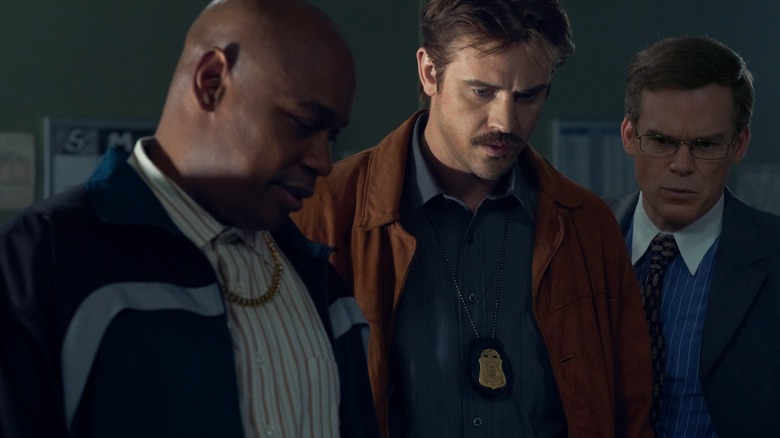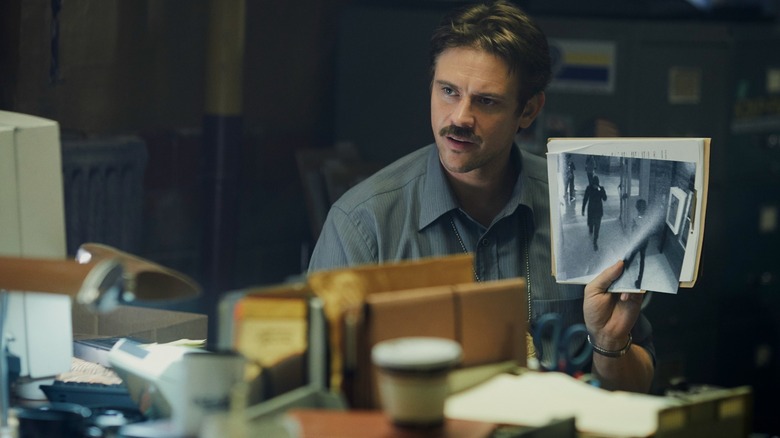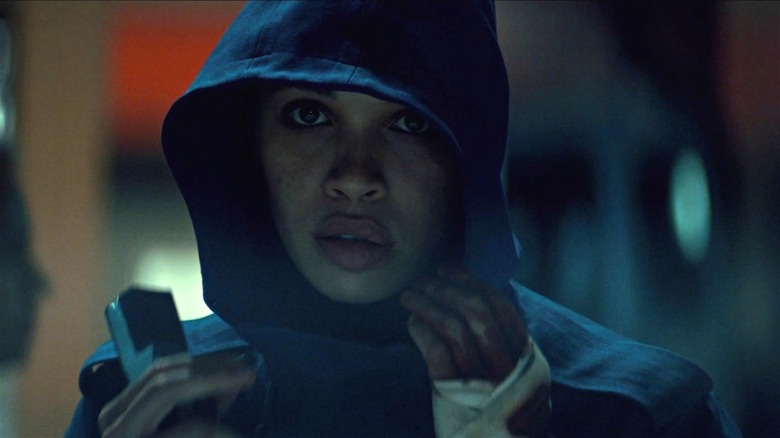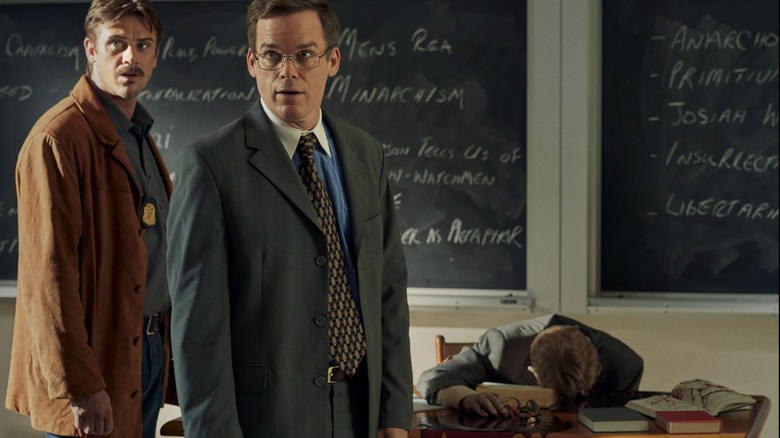In The Shadow Of The Moon Ending Explained: Time Is Not A Flat Circle
Spoilers follow.
Time travel as a plot device is inherently tricky to pull off in a serious, dramatic setting, as it introduces logical paradoxes that remain unexplained even by scientific theory. There's the Grandfather paradox, which introduces too many inconsistencies within a timeline, and the question of negated intent once the goals facilitated by time travel are accomplished. However, if the story is gripping and twisty enough, and ends on a satisfactory note, such inconsistencies can be easily sidelined. But when it comes to a film like "In the Shadow of the Moon," the case becomes inherently complicated, especially when you dissect the time travel mechanics it employs.
"In the Shadow of the Moon" ends on a rather triumphant note, where the time travel accomplishes its goal, and the protagonists, Lockie (Boyd Holbrook) and Rya (Cleopatra Coleman), are given the opportunity to start over. While this works from a character standpoint, the ending leaves us with more questions than answers. While Rya's plan to travel backward in time to avert a race-motivated civil war is logical enough, the nuances of the story are lost as the web of mysteries deepens, and the untangling in the end is sudden and anticlimactic.
To director Jim Mickle's credit, however, "In the Shadow of the Moon" does not have a single predictable moment, and even when things become crystal clear, there's always a heady detail that unravels when one least expects it. There's definitely more than meets the eye, so let's dive into the story and make sense of the twisty ending that breaks most time travel rules, for better or worse.
Breaking linear logic
"In the Shadow of the Moon" is about breaking a toxic loop, or untangling a doomed ouroboros to ensure a better world. At least that's how Rya perceives her motivations, as she is tasked with traveling backward in time to eliminate those who will contribute to a catastrophic white supremacist movement in the future. This future is laid bare in the opening scene, set in Philadelphia in 2024, where the world burns with a severely altered American flag in the frame. This is the extremist vision that needs to be uprooted even before its seeds are sown — essentially, all traces that contribute to a butterfly effect need to be eliminated. While we will delve into the ethics of such an act later, here's a quick refresher on the baseline events that trigger the ending.
After the opening, we jump back in time to 1988, where Lockie, an ambitious Philadelphia cop is introduced, investigating a serial murder case alongside his partner, Maddox (Bokeem Woodbine). All the victims, who are seemingly unrelated, hemorrhage to their deaths in gruesome ways. The only evidence of wrongdoing is three tiny puncture wounds on the base of their necks, mimicking a triangle. Lockie's involvement with the case is not accidental, of course, as it will grow to haunt him throughout his life, and eventually alter the course of history.
Lockie's only suspect is a woman whom he encounters even after she apparently dies in 1988. As she appears at an interval of every 9 years since then, Lockie comes to a terrible realization: the woman is traveling backward in time while everyone is moving forward concurrently, and these temporal intersections allow her to alter the course of history, which directly impacts the future.
The stakes are terribly personal
The first half of the film unravels like a police procedural, where Lockie and Maddox are busy inspecting clues and chasing an elusive suspect. After Maddox dies, Lockie is left to mire in the obsession of finding the killer alone, and this is when he realizes that he's more intimately involved with the case than he imagined. Details about Lockie's personal life, such as the death of his wife during childbirth and the fact that he has to parent his daughter, Amy, alone, suddenly become more pertinent when the suspect relays these events to him even before they occur.
The twist towards the end is the reveal that the suspect, Rya, is actually Amy, Lockie's daughter, who was sent by him to the past to remedy the catastrophe in the future. This revelation destabilizes Lockie's perception of reality and the understanding of his evolving relationship with socio-political unrest and violence. The schism presented is frustrating to watch, as "In the Shadow of the Moon" attempts to offer social commentary without diving into the nuances of the heavy subject matter. With Rya propped up as the one who prevents race-based violence and injustice, there's little exploration of what her actions mean from an ethical standpoint.
This is a time-tested ethical question of whether it is okay to go back in time and murder someone to prevent a tragedy later down the line, and the answers are never simple, as one needs to consider a range of situational factors. However, "In the Shadow of the Moon" doesn't offer any answers either, as it opts for a personal journey that involves time travel and sociopolitical edge, but doesn't bother fleshing out any of these aspects convincingly.
Perspective is everything
The entirety of the film is experienced through Lockie's perspective, as he experiences time like the rest of us, and balks when he realizes that Rya/Amy is experiencing time backward. While this helps root us in the perspective of someone who experiences the reveal just as we do, it robs us (and the premise) of something more valuable: Rya's perspective of reverse chronology, tethered to lunar cycles that create a bridge between two timelines.
This perspective is infinitely more interesting and is never glimpsed at any point, which breaks the unspoken rule of unraveling events from the perspective of the person doing the time traveling. This is where films like "Synchronic" succeed, as it is much more impactful when the traveler is our tether, and no amount of twists or emotional curveballs can overshadow the necessity of a solid perspective-rich experience.
Another reason why the ending of the film feels unearned is that it is revealed by Rya within the last 10 minutes. There is simply too little time to unload a reveal this involved and intimate, and there's a considerable amount of "telling" instead of "showing" doing the heavy lifting here. While character expositions work when executed well enough, here, everything uttered feels almost hollow, especially when Rya talks about the values Lockie taught her to prepare her for such a journey. The intended impact is the opposite of that in "Tenet" — while the Protagonist and Neil are never shown meeting in the future (the starting point), the relationship feels complete and the puzzle works.
The narrative of "In the Shadow of the Moon" shines only at points where Rya and Lockie's perspectives intersect, creating a cause-and-effect chain that is mindbending, yet pretty simple when dissected. The rest feels like static: unnecessary and intermittent.
A hollow, fragile core
A key player in Rya and Lockie's plan is Naveen Rao (Rudi Dharmalingam), the doctor who pioneers the time travel technology and assists Rya in her mission to inject her targets. While the extent of his involvement makes sense, the nature of the assassinations carried out is rather complicated. While Rya travels to the past at the interval every 9 years (when the unique lunar conjunction occurs) and injects a victim physically, the deaths are actually triggered in the future by Naveen himself. The reasoning presented is that the deaths need to occur simultaneously, but the "why" is never explained. This is a pretty glaring loophole, as the gap between Rya's attack and the triggered assassination allows ample chance for the targets to report to the authorities — but for some reason, they don't.
Moreover, the glaring tragedy that lingers throughout is that Lockie's actions directly affect Rya in the future, which eventually leads to her unwitting death at Lockie's hands in 1988. This action cannot be undone, and while Lockie has time to spend time with Rya from 2015 onward now that the civil war has been averted, this second chance does not make sense from a temporal perspective. If her death is inevitable, as events cannot be altered, then her mission loses immediate meaning, as determinism directly challenges free will and the ability to alter the past via time travel.
Moreover, once the mission is accomplished, the onus for the mission itself is erased, which presents a fresh set of contradictions that are rather difficult to reconcile. While it's tempting to suspend disbelief for the sake of convincing fiction, "In the Shadow of the Moon" has a hollow, fragile core, that falls apart on scrutiny, taking down its very integrity along with it.




